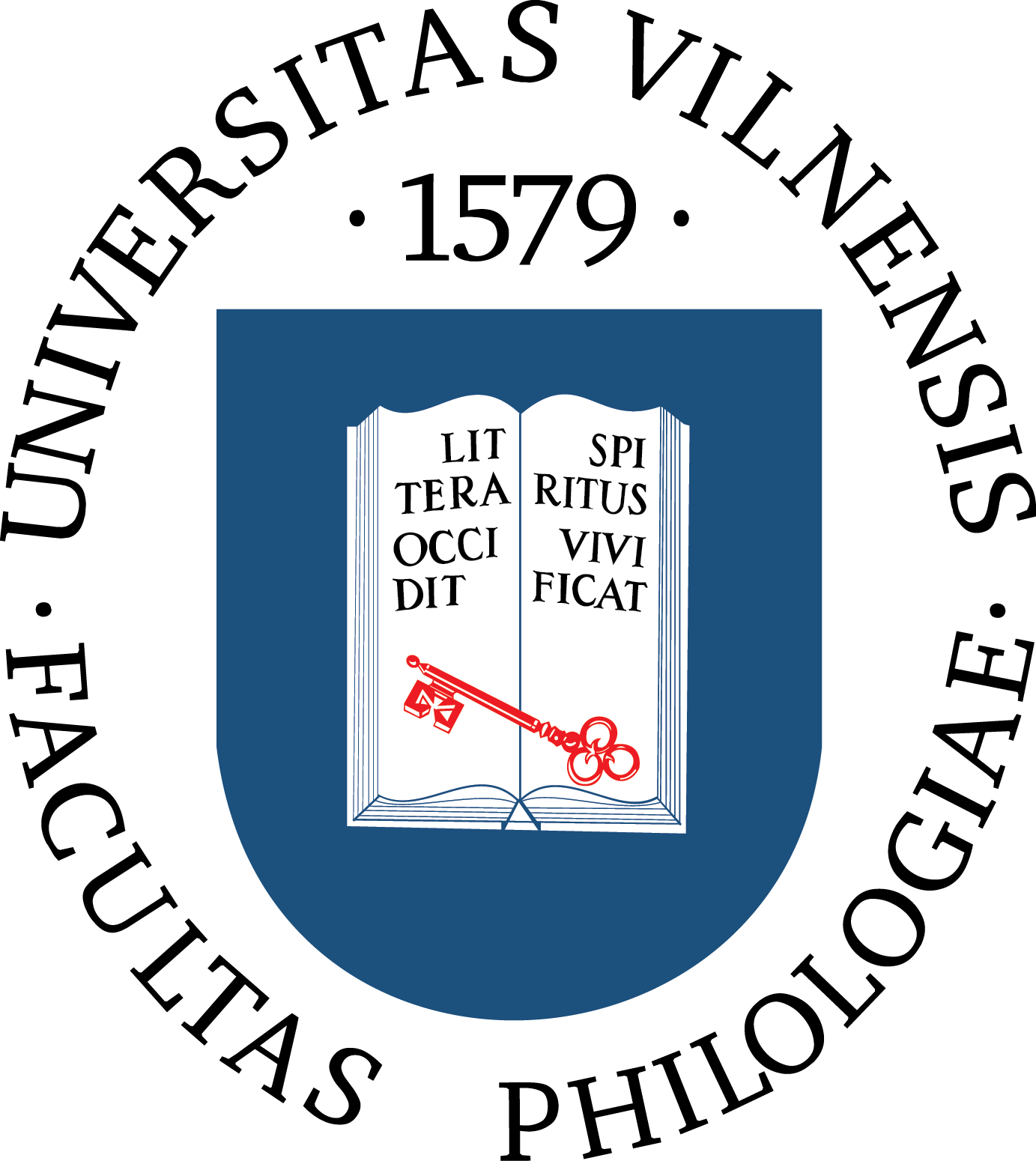CONFERENCE PROGRAMME
BOOK OF ABSTRACTS
CALL FOR PAPERS
Journal VERTIMO STUDIJOS (STUDIES IN TRANSLATION),
Special Issue on Translation, Ideology, Ethics: Response and Credibility
Online publication: June 2023
Deadline: 15 January 2023
Editor of the Special Issue: Nijolė Maskaliūnienė
Dear colleagues,
We are inviting submissions for the Special Issue of the journal VERTIMO STUDIJOS (STUDIES IN TRANSLATION) on Translation, Ideology, Ethics: Response and Credibility.
VERTIMO STUDIJOS (STUDIES IN TRANSLATION), ISSN 2029-7033 | eISSN 2424-3590, is an annual academic international peer-reviewed journal that publishes articles covering a wide range of topics concerning translation and interpreting. The goal of the publication is to provide a forum for discussion on the theory and practice of translation, to introduce the latest findings in translation research to its readership, to encourage scholarly discussion and seek answers to questions raised in the fields of translation and interpreting. The submitted articles are peer-reviewed and discussed by the members of the Editorial Board.
Indexed in: BASE, CNKI, CORE, CEEOL, Dimensions, DOAJ Seal, ERIH-PLUS, Google Scholar (h5-index 2, g5-index 2), HEAL link (Hellenic Academic Libraries Link), JournalTOCs, Lituanistika, MLA Directory of Periodicals, MLA International Bibliography, QOAM, ROAD, ScienceGate, ScienceOpen, Scilit. Member of Initiative for Open Citations (i4OC) and The Initiative for Open Abstracts (I4OA).
EDITORIAL LINE
The Special Issue is focused on the topics covered by the preceding conference ‘Translation, ideology, ethics: Response and credibility’ (Vilnius University, 22–24 September 2022). The more detailed description of the topics and problems covered can be found on the Conference Website, here:
http://www.vertimas2022.flf.vu.lt/about-the-conference-2/
SUBMISSION
- Papers (in English or Lithuanian) should be sent via Submission platform https://www.journals.vu.lt/vertimo-studijos/about/submissions
- The Guidelines are attached;
- Contacts for inquiry: Deimantė Veličkienė <deimante.velickiene@flf.vu.lt>.
IMPORTANT DATES
- Manuscript submission: 15 January 2023.
- Final decision of the editorial board: 28 February 2023.
- Online publication: June 2023.
EDITORIAL BOARD
- Editorial Board https://www.journals.vu.lt/vertimo-studijos/about/editorialTeam
SPECIAL ISSUE EDITOR
- Prof. dr. Nijolė Maskaliūnienė
KEYNOTE TALKS
Jorge Díaz-Cintas
University College London
NAVIGATING IDEOLOGICAL MEANDERS IN AUDIOVISUAL TRANSLATION
Remaining faithful to the creative intent of the original work is one of the driving mantras behind the practice of translation, though how to achieve such a feat is more often than not open to discussion, if not controversy. In today’s digital society, audiovisual productions occupy a pole position as a site of contact between cultures, making them an influential artifact for the transmission, not only of factual information, but also of moral values, cultural clichés, and stereotypes that can be either translated at face value or ideologically manipulated to suit the interests of different stakeholders. Drawing on illustrative examples, this presentation explores how audiovisual translation becomes a locus of power struggles in which the end result is not solely dictated by linguistic asymmetries between the languages in contact but also by decisions based on power, dominance, and ideology.
Nike K. Pokorn
University of Ljubljana
CONTROL, CONFORMITY AND DISSENT IN A SOCIALIST STATE PUBLISHING HOUSE
In socialist states translation was crucial for the success of the ideological program of the Communist Party and therefore communist ideological imperatives were clearly reflected in translation and publishing policies. Since particular attention was paid to ideological indoctrination of new generations, translations for children reveal the values of socialist societies, while the publishing process leading to a publication of translations shows the hidden workings of socialist ideological control. Through extensive research of the archives and interviews with the editors, the presentation identifies the main agents responsible for ideological shifts in translations and explains some isolated instances of dissent by focusing on the publishing house Mladinska knjiga, the largest publishing house of children’s literature in the Socialist Republic of Slovenia.
Sharon O’Brien
Dublin City University
TRANSLATION AS CRISIS RESPONSE
The crucial role that translation and interpreting play in crisis communication is gaining increasing recognition. Though the need for timely, accurate and clear communication in crisis and disaster settings has been recognised for a long time, the need for multilingual communication — enabled through translation and interpreting — had not been extensively recognised, discussed or researched. In the past few years this situation has changed and many studies have been published that highlight how crucial it is to plan for translation in a crisis. This need has been further underlined by the recent COVID-19 pandemic. In this talk, I will touch upon some of the work that has been carried out, highlighting topics such as emergency response policy, technology, training, and ethics, to showcase how T&I research is contributing to this important topic. Consideration will also be given to future research directions to ensure that we continue to grow momentum on translation as crisis response.
Elisabet Tiselius
Stockholm University
RESEARCHER CREDIBILITY: ESTABLISHING TRUST
Research into the interpreting practice has a few specificities which put high demands on interpreting researchers. Studies involve human participants in an overwhelming majority of studies, and these participants are more often than not acquaintances, colleagues, students or otherwise known to the researchers themselves. Others may be vulnerable groups in society such as medical patients, children or criminal suspects.
These characteristics require the researcher to be highly aware of their own position, ideology, voice and responsibility. In order to gain and uphold credibility in different communities (research as well as the professional), and of course in relation to the participants, the researcher needs to take these aspects into account already from the outset of the planning of a study.
In my talk, I would like to approach different aspects of researcher credibility and how to establish trust in different types of research studies and to different counterparties. Trust needs to be established both in terms of scientific rigor for preparing, designing and reporting the study, and also in the recruitment and relationship to participants. I will give examples from different studies, different methods and different researchers, and describe how trust can be gained, but also lost for several different reasons.
I will use interpreting studies as example to discuss the potentials, but also the risks, of being a researcher deeply embedded in the community studied.
WORKSHOP KEYNOTE TALK
Joss Moorkens
Dublin City University
ETHICS AND SUSTAINABILITY IN MACHINE TRANSLATION
Neural machine translation (MT) can facilitate communication in a way that surpasses previous MT paradigms, but there are also consequences of its use. As with the development of any technology, MT is not ethically neutral, but rather reflects the values of those behind its development. This presentation reflects on ethical issues around MT, beginning with data gathering and reuse and looking at how MT fits with the values and codes of the translator. The computing power requirements of neural networks also behoves us to think about issues of environmental as well as social sustainability related to the deployment of MT. Rather than promoting an approach that involves following a set of instructions to implement a technology unthinkingly, contemporary thinking in this area highlights the importance of a conscious decision-making process when designing a data-driven MT workflow.

